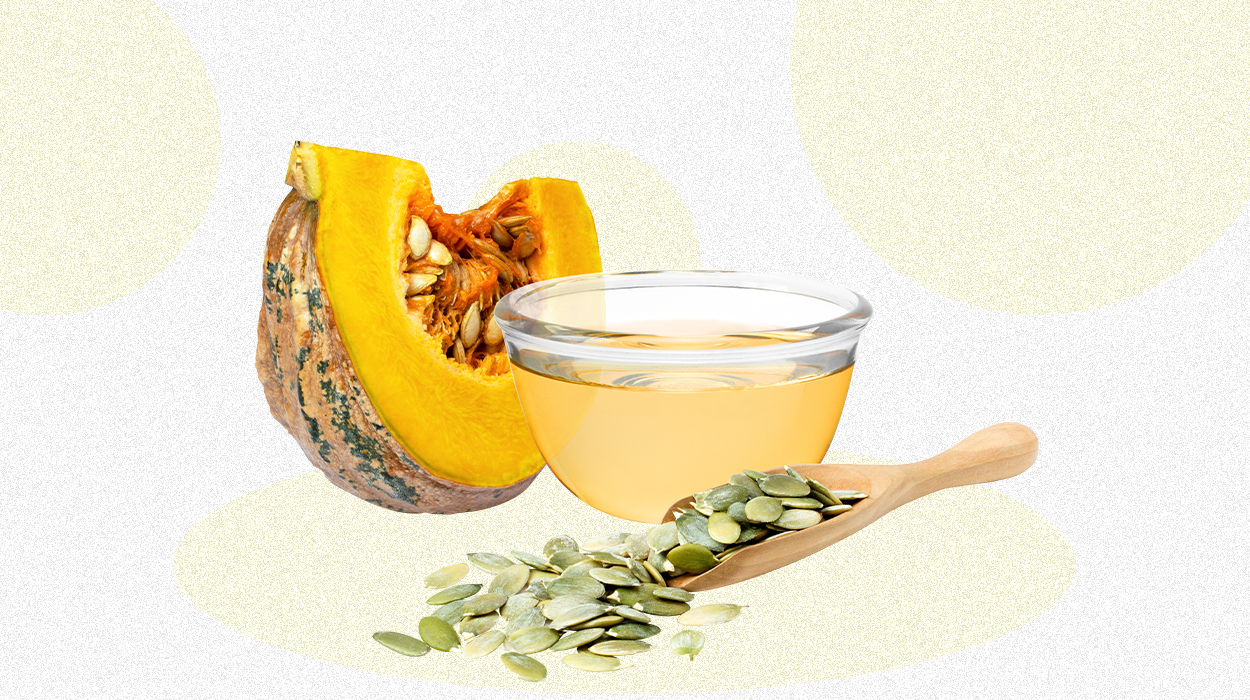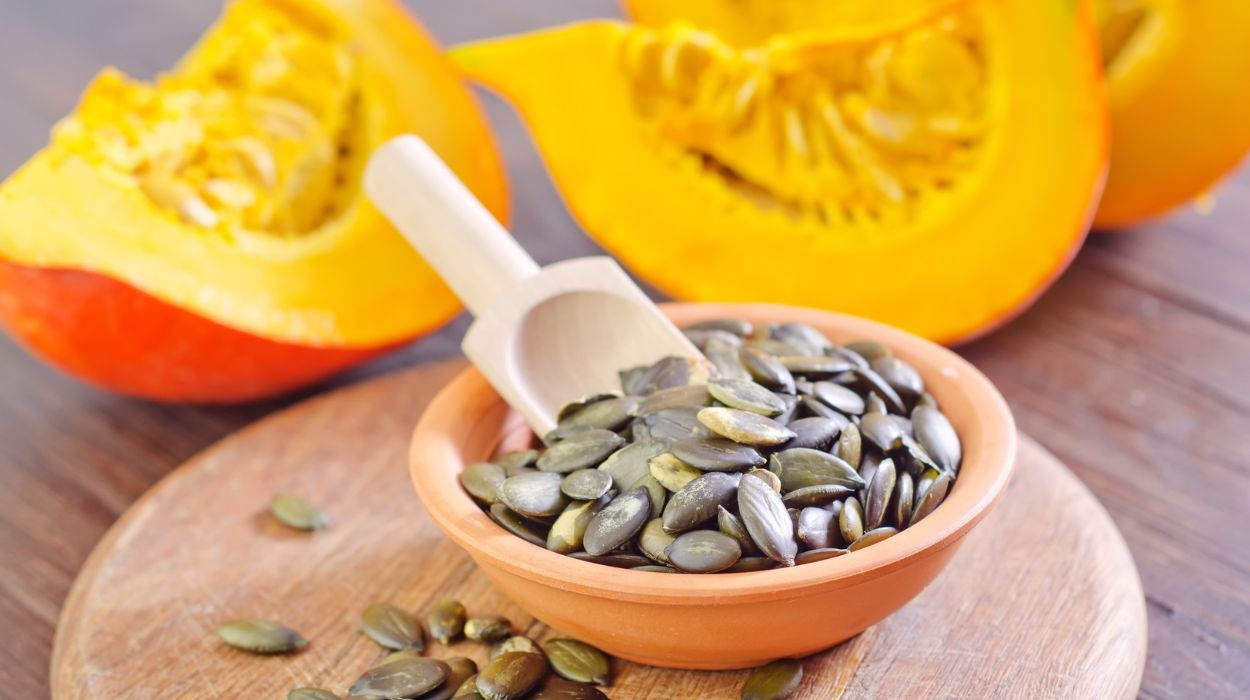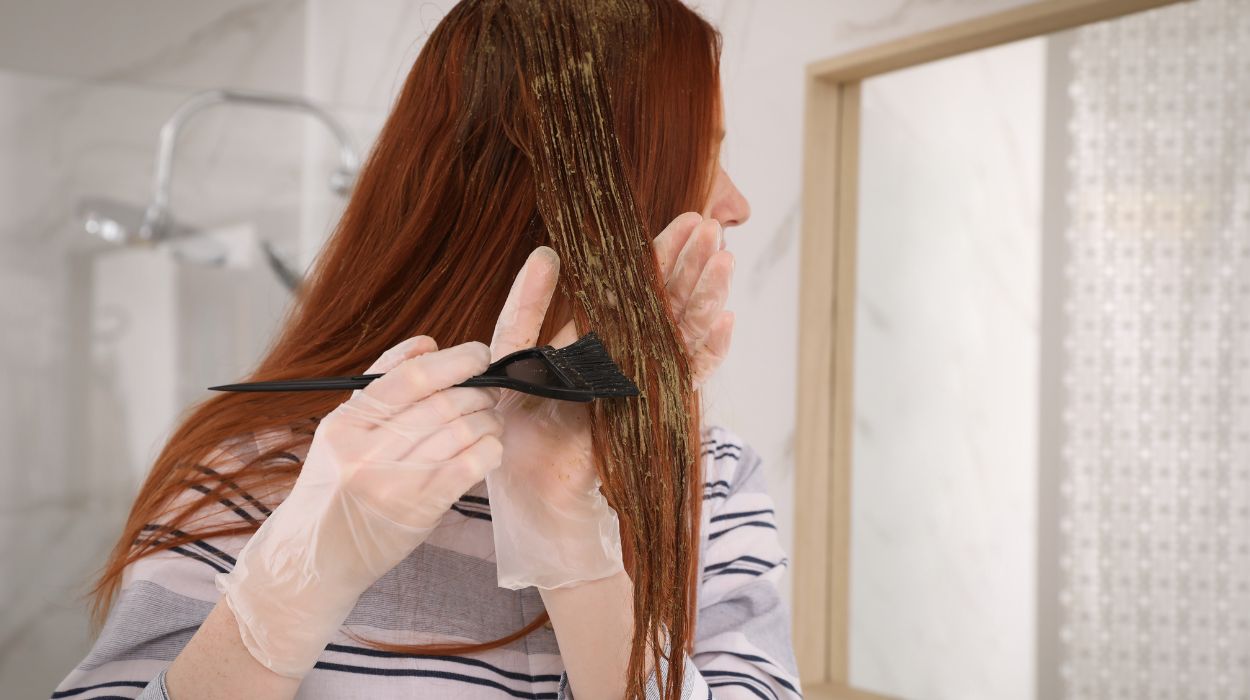 Expert's opinion
Expert's opinion
Expert's opinion
The article is a subjective view on this topic written by writers specializing in medical writing.
It may reflect on a personal journey surrounding struggles with an illness or medical condition, involve product comparisons, diet considerations, or other health-related opinions.
Although the view is entirely that of the writer, it is based on academic experiences and scientific research they have conducted; it is fact-checked by a team of degreed medical experts, and validated by sources attached to the article.
The numbers in parenthesis (1,2,3) will take you to clickable links to related scientific papers.
Pumpkin Seed Oil For Hair: Is It Effective & How To Uses In 2024

Are you looking for a natural way to make your hair look thicker and healthier? If so, pumpkin seed oil may be just what you need. This popular botanical oil delivers antioxidants, vitamins, minerals, and fatty acids that can nourish your scalp, fight frizz, and keep your locks looking healthy. Many people also recommend using pumpkin seed oil to combat hair loss. But does pumpkin seed oil help hair growth?
In this article, we’ll break down the benefits of pumpkin seed oil for your hair, explain why it might work to prevent hair loss, and show you how to use it as part of your hair care routine.
Key Takeaways
- Pumpkin seed oil is packed with beneficial nutrients to improve the health and appearance of your hair. Specifically,[1] This oil is rich in unsaturated fatty acids, antioxidants, and phytosterols.
- Some research suggests pumpkin seed oil can promote hair growth by opposing the conversion[2] of testosterone to dihydrotestosterone — DHT — felt to be a major driver of hair loss via hair root weakness, hair growth reduction, and hair loss. One study showed that taking pumpkin seed oil supplements for six months boosted hair growth by 40% in men with androgenetic alopecia. However, more research is needed to understand these effects.
- Overall, pumpkin seed oil is a natural and safe[3] option worth considering to treat hair loss and improve hair health, but it does take time to see results.
Pumpkin Seed Oil For Hair: Is It Good?
Yes, but more research is needed to fully understand pumpkin seed oil’s benefits and uses.
Packed with vitamin E, omega-3 and omega-6 fatty acids, and zinc, pumpkin seed oil can improve the health and appearance of your hair by moisturizing your scalp, strengthening hair follicles, and reducing inflammation.
Studies have also shown that pumpkin seed oil may help treat androgenetic alopecia. This condition — more commonly known as female or male pattern hair loss — affects nearly 50% of men and 25% of women by age 50.
Experts believe that the phytosterol content in pumpkin seed oil blocks the production of DHT,[4] a hormone that causes this type of hair loss.
In one study,[5] men with androgenetic alopecia increased hair growth by 40% when taking pumpkin seed oil supplements for 24 weeks.
These are exciting results, but some issues with this study make it difficult to know whether pumpkin seed oil for hair growth. For example:
- It was a small study and only included results from 76 adult men.
- Due to the study population being all men, we can’t know if women, or other demographic categories, would see the same hair growth results.
- The pumpkin seed oil supplement used in this study contained other ingredients, including a mixed vegetable powder, corn silk powder, octacosanol, and primrose oil. Because of this, it’s unclear whether pumpkin seed oil or one of these other ingredients was responsible for these results.
- Much of the data was from participants’ self-appraisal of hair growth, adding subjective bias.
Despite these limitations, the study was overall promising for pumpkin seed oil, although more research is needed. This study and other animal-based studies[6] suggest that pumpkin seed oil might be valuable in fighting male and female pattern hair loss.
A recent study[7] also demonstrated that pumpkin seed oil had comparable results to minoxidil in women.
Plus, pumpkin seed oil provides other hair benefits, is inexpensive, and has a low risk of side effects. For these reasons, consider adding this natural oil to your hair care routine.
What Is Pumpkin Seed Oil?

Put simply, pumpkin seed oil is a nutrient-rich oil obtained by cold-pressing pumpkin seeds. The nutritional content of this oil may vary based on the exact method used; however, these differences are minimal, so there are no best pumpkin seeds for hair growth.
Pumpkin seed oil has a dark green color and nutty flavor that can add depth and richness to recipes. For many years, people have used it as a natural remedy for hair growth promotion, and skin, digestive, and urinary issues.
Benefits Of Pumpkin Seed Oil For Hair
Whether you apply this oil directly to your tresses or use pumpkin seed oil in your diet, this nourishing oil can help:
- Moisturize dry and frizzy hair. Packed with fatty acids — like oleic and linoleic acid — this oil is an excellent topical treatment for hydrating dry and frizzy hair.
- Add shine. When applied directly to hair, pumpkin seed oil adds a light-reflecting layer, boosting the shine and luminosity of each strand.
- Fight scalp itch and inflammation. This oil provides healthy doses[8] of vitamin E and omega-3 fatty acids, critical nutrients to skin health. Together they can fight skin inflammation that leads to a dry and itchy scalp.
- Protect your hair from damage. Coating your hair with a botanical oil can provide a physical buffer that protects it from heat damage and tangling. Plus, this oil provides antioxidants and magnesium, which strengthen weak hair and guard against damage from ultraviolet rays.
- Protect against hair loss. Experts believe the phytosterols in pumpkin seed oils can block enzymes, i.e., 5-alpha-reductase, and hormones, i.e., DHT, that cause hair loss. Also, massaging this oil directly into your scalp can improve blood flow to this area, delivering oxygen and nutrients to each hair follicle to promote hair growth.
Who Should Use Pumpkin Seed Oil?
People who struggle with dry, brittle, or frizzy hair will benefit the most from adding pumpkin seed oil to their haircare routine. However, you’ll want to skip this oil if you battle greasy and flat hair.
While side effects are rare, some people experience stomach upset, itching, or rash when they consume pumpkin seed oil in their diet. People who are allergic to pumpkins should avoid any form of this oil.
Pumpkin seed oil may also be an excellent choice for people looking for an all-natural alternative to standard hair loss medications. While minoxidil and finasteride are the gold standards for treating hair loss, their side effects can make it hard for some people to stick with these treatments. Studies[9] comparing pumpkin seed oil to pharmaceutical products have demonstrated similar effects.
In these cases, researchers continue to investigate whether botanical oils like pumpkin seed[7] or rosemary oil[10] may be the next best option for promoting hair growth.
How To Use It Effectively

Use As A Topical Hair Treatment
Like most botanical oils, pumpkin seed oil can increase hair thickness and transform dry, brittle, frizzy hair into a soft and manageable mane. Here are the best ways to add this oil to your hair care plan:
- Add it to your current shampoo. Put a few drops in your favorite shampoo. Apply to your hair and let sit for a few minutes before rinsing clean.
- Apply as a leave-in conditioner. Apply a generous amount of pumpkin seed oil to wet hair, thoroughly coating each strand. Comb through and allow to air dry.
- Make a pre-shampoo hot oil treatment. Massage pumpkin oil for hair into dry hair, saturating it completely. Wrap your hair in a warm towel and sit for 20 to 30 minutes before washing it with your regular shampoo.
- Use it to smooth and style your hair. Once your hair is dry, use your fingertips to smooth a few drops of pumpkin seed oil through your hair, focusing on your ends. This oil will smooth flyaways, add shine, and protect ends.
- Mix a do-it-yourself heat-protectant spray. Mix a tablespoon of pumpkin seed oil into a cup of water in a spray bottle. Lightly spray this mixture onto damp hair before using heat styling tools.
Take A Pumpkin Seed Oil Supplement
Plenty of pumpkin seed oil supplements are available to improve the health of your hair from the inside out. A supplement may be the best choice for combating hair loss, as studies evaluating this benefit used oral supplements at dosages of around 400 milligrams daily.
These supplements are available in liquid and capsule forms, though many people find the capsule options most convenient. Dosages of 1000mg are commonly available. Take one dose daily or every other day to support healthy hair growth.
Keep in mind supplements are loosely regulated. Look for supplement options that a reputable company produces. Ideally, the one you choose should be third-party tested, which confirms that the product contains the right ingredients and nothing extra.
It’s also always a good idea to consult your healthcare provider before using any supplement.
Add Pumpkin Seed Oil To Your Diet
Pumpkin seed oil is full of vitamins, minerals, and nutrients that benefit your overall health, including your hair health. Researchers have linked this nourishing oil to cardiovascular, urinary, and prostate health improvements.
Including this oil in your diet is a great way to reap the holistic health benefits of pumpkin seed oil’s effects.
Due to its low smoke point, you’ll want to avoid using it for high-heat cooking; however, here are a few delicious ways to add this oil to your favorite recipes:
- Drizzle over a salad as a healthy and flavorful dressing.
- Add to smoothies or shakes for an extra boost of nutrients.
- Use as a finishing oil by tossing into roasted vegetables, pasta dishes, or grilled meats.
- Make a homemade pesto sauce by blending this oil with garlic, basil, and parmesan cheese.
What’s Better? Topical Or Oral?
There isn’t any good data in the literature that indicates whether applying pumpkin seed directly to your hair vs orally[11] ingesting it gets better results. Yet, there is a lot of data on topical application and oral ingestion, separately.
At this time it cannot be said which is better, except that oral ingestion as a supplement or in your food may be more convenient than applying it to your hair in cumbersome, time-consuming rituals. Thus, compliance may be the determining factor of which is better.
Also, ingesting anything means it is distributed systemically. This increases the risk of side effects, which could impact compliance and efficacy.
The Bottom Line
Pumpkin seed oil is a versatile and nutrient-rich product that offers many benefits for overall hair health. Its high concentration of vitamins, minerals, and fatty acids can help moisturize the hair and scalp, promote stronger hair strands, and improve hair shine and manageability.
Additionally, its power as an anti-inflammatory and antioxidant gives benefits that may go way beyond just its cosmetic allure with hair. The scientific research on the effects of pumpkin seed oil on hair growth is currently limited, but it is ever-increasing with encouraging results. Thus, it is worth considering if you’re seeking an all-natural alternative to existing medical treatments for hair loss.
Pumpkin seed oil can be added to your usual hair care routine or included in your diet in supplement or food form. Overall it is considered a safe product with minimal risk of side effects.
Remember, it takes time for results to show, so it is important to be patient and consistent with the use of pumpkin oil. Whether you are struggling with hair loss or simply looking to achieve healthier, more vibrant locks, pumpkin seed oil is worth considering.
+ 11 sources
Health Canal avoids using tertiary references. We have strict sourcing guidelines and rely on peer-reviewed studies, academic researches from medical associations and institutions. To ensure the accuracy of articles in Health Canal, you can read more about the editorial process here
- Prommaban, A., Kuanchoom, R., Seepuan, N. and Chaiyana, W. (2021). Evaluation of Fatty Acid Compositions, Antioxidant, and Pharmacological Activities of Pumpkin (Cucurbita moschata) Seed Oil from Aqueous Enzymatic Extraction. Plants, [online] 10(8), p.1582. doi:https://doi.org/10.3390/plants10081582.
- Teeranachaideekul, V., Parichatikanond, W., Junyaprasert, V.B. and Morakul, B. (2022). Pumpkin Seed Oil-Loaded Niosomes for Topical Application: 5α-Reductase Inhibitory, Anti-Inflammatory, and In Vivo Anti-Hair Loss Effects. Pharmaceuticals, [online] 15(8), p.930. doi:https://doi.org/10.3390/ph15080930.
- Dhariwala, M.Y. and Ravikumar, P. (2019). An overview of herbal alternatives in androgenetic alopecia. Journal of Cosmetic Dermatology. [online] doi:https://doi.org/10.1111/jocd.12930.
- Daniels, G., Akram, S., Westgate, G.E. and Tamburic, S. (2019). Can plant-derived phytochemicals provide symptom relief for hair loss? A critical review. International Journal of Cosmetic Science, [online] 41(4), pp.332–345. doi:https://doi.org/10.1111/ics.12554.
- Prommaban, A., Kuanchoom, R., Seepuan, N. and Chaiyana, W. (2021). Evaluation of Fatty Acid Compositions, Antioxidant, and Pharmacological Activities of Pumpkin (Cucurbita moschata) Seed Oil from Aqueous Enzymatic Extraction. Plants, [online] 10(8), p.1582. doi:https://doi.org/10.3390/plants10081582.
- Teeranachaideekul, V., Parichatikanond, W., Junyaprasert, V.B. and Morakul, B. (2022). Pumpkin Seed Oil-Loaded Niosomes for Topical Application: 5α-Reductase Inhibitory, Anti-Inflammatory, and In Vivo Anti-Hair Loss Effects. Pharmaceuticals, [online] 15(8), p.930. doi:https://doi.org/10.3390/ph15080930.
- Dhariwala, M.Y. and Ravikumar, P. (2019). An overview of herbal alternatives in androgenetic alopecia. Journal of Cosmetic Dermatology. [online] doi:https://doi.org/10.1111/jocd.12930.
- Shaban, A. and Sahu, R.P. (2017). Pumpkin Seed Oil: An Alternative Medicine. International Journal of Pharmacognosy and Phytochemical Research, [online] 9(2). doi:https://doi.org/10.25258/phyto.v9i2.8066.
- Ibrahim, I.M., Saeed, M., Elsabaa, K.I. and Elsaie, M.L. (2021). Pumpkin Seed Oil vs. Minoxidil 5% Topical Foam for the Treatment of Female Pattern Hair Loss: A Randomized… [online] ResearchGate. Available at: https://www.researchgate.net/publication/349082565_Pumpkin_Seed_Oil_vs_Minoxidil_5_Topical_Foam_for_the_Treatment_of_Female_Pattern_Hair_Loss_A_Randomized_Comparative_Trial?enrichId=rgreq-6e669d41aa24c5be4b406c128152a8f4-XXX&enrichSource=Y292ZXJQYWdlOzM0OTA4MjU2NTtBUzoxMDA1MTgwNzQ5MzQ4ODY5QDE2MTY2NjUxNzQ3NTE%3D&el=1_x_2&_esc=publicationCoverPdf
- Panahi (2015). Rosemary oil vs minoxidil 2% for the treatment of androgenetic alopecia: a randomized comparative trial. Skinmed, [online] 13(1). Available at: https://pubmed.ncbi.nlm.nih.gov/25842469/
- Nestor, M.S., Ablon, G., Gade, A., Han, H. and Fischer, D.L. (2021). Treatment options for androgenetic alopecia: Efficacy, side effects, compliance, financial considerations, and ethics. Journal of Cosmetic Dermatology, [online] 20(12), pp.3759–3781. doi:https://doi.org/10.1111/jocd.14537.



